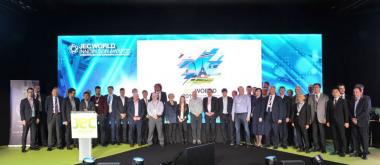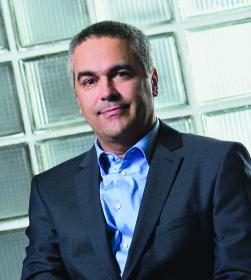Oerlikon Manmade Fibers Segment at the OpenStack Summit in Berlin
"Datacenter in a box" is the new powerful, flexible and secure IT infrastructure solution for the textile industry of the future
Remscheid/Berlin – Oerlikon Manmade Fibers Segment Industrie 4.0 solutions for the production of polyester, nylon and polypropylene are based on the digitalization of the production landscape and the intelligent processing of the flood of data generated in this way. In the future, the segment will offer its customers a new powerful, flexible and, above all, secure IT infrastructure. The "Datacenter in a box" was presented for the first time at the OpenStack Summit in Berlin, Germany, to a broad specialist audience. The compact datacenter works on the basis of the open operating system OpenStack, which enables virtual computing in a secure private cloud environment.
Externally, the datacenter looks unspectacular: The box contains standard hardware such as server rack, network components, batteries for reliability, monitoring sensors and a few more things. But what counts are the inner values. The Open Source software OpenStack consists of many different services and allows the virtualization of a large pool of computing, storage and network resources in a flexible, scalable private cloud. This brings two central advantages: On the one hand, virtual operation reduces costs and simplifies configuration, adaptation and expansion of the IT infrastructure today and tomorrow. On the other hand, long-cherished wishes for high data protection are fulfilled, because a private cloud maintains secure, highly encrypted data connections away from the World Wide Web.
"The functional diversity of a cloud, operation and hardware in one's own four walls at the same time – our customers immediately understood these advantages" reports Mario Arcidiacono, specialist for Business Intelligence & Data Warehouse at the Oerlikon Manmade Fibers Segment. The IT architecture also guarantees infrastructure management without downtime, the system and virus protection are automatically kept up to date at all times. Another major advantage is the scalability of the hardware and software, which can be adapted to changing requirements.
OpenStack Summit: Project example with yarn manufacturer from Vietnam presented
With these trump cards and a project example, the Group segment confidently presented itself to a genuine specialist audience in mid-November. At this year's OpenStack Summit in Berlin, where thousands of cloud professionals met, Oerlikon Manmade Fibers Segment CEO Georg Stausberg presented the customer installation at Century Synthetic Fibre Corporation, which supplies many well-known sporting goods manufacturers. The Vietnamese producer of high-quality yarns not only uses the new datacenter, but also the connection to the new "Common Service Platform (CSP)" of the Oerlikon Manmade Fibers Segment as well as an innovative new dashboard solution in prototype status. In this case, the digital instrument panel supports employee communication during shift changes in the yarn factory and introduces agile methods into the work process. The board visualizes the progress of central key figures and operating parameters from the current production process. Based on this, the employees of the successive shifts can now exchange important process and quality information and possible instructions for action within a few minutes in a structured stand-up meeting. "For the customer this means an immediate improvement of the processes, and he can significantly increase the efficiency and quality of his employees' work," assures Joerg Gross, Senior Manager in the IT-architecture team at the Oerlikon Manmade Fibers Segment.
New IT-basis for the Plant Operation Center (POC) already successful established on the market
The fixed connection to the "Common Service Platform (CSP)" of the Oerlikon Manmade Fibers Segment plays a pioneering role in such solutions. This enables services and software updates to be provided smoothly, quickly and automatically. In this way, service applications can transform collected data into instructions or automated commands to secure and improve processes. For example, the secure availability of management solutions such as the Plant Operation Center (POC) for process monitoring can be increased and possible errors can be rectified very quickly. The new digital solution AIM4DTY (AIM = Artificial Intelligence Manufacturing), which was unveiled at the ITMA ASIA + CITME 2018 in Shanghai, China, a few weeks ago, can also be implemented in this way. AIM4DTY uses methods of machine learning, determines probable causes of errors in texturing and helps to improve quality during production.
Launch at ITMA Barcelona 2019
The Oerlikon Manmade Fibers Segment offers such remote-supported services on request. Data will therefore only be transferred to the “Common Service Platform (CSP)” with the customer's consent. In addition, all data is processed in accordance with the new European General Data Protection Regulation (GDPR) and all other international data protection standards. Against this backdrop, the Oerlikon Manmade Fibers Segment plans to provide its datacenter with graded or customer-specific solutions: from complete service to provision with customer training for its own operations. After initial practical experience with several pilot customers, the segment intends to launch its offering on the market next year and officially present it to the textile industry at ITMA 2019 in Barcelona, Spain.
Oerlikon Marketing, Corporate Communications & Public Affairs











